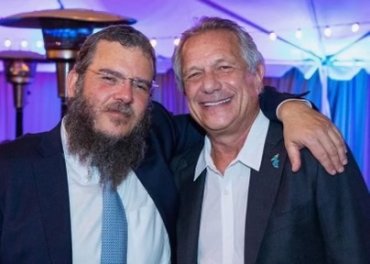The Orthodox Jewish Beatboxers Are Back For Round Two!
The internet has been abuzz over the past two weeks since Orthodox Jewish beatboxers Ilan Swartz-Brownstein and Josh Leviton made their debut on America’s Got Talent. These kippah-clad men in glasses, tzitzits, and easy smiles shocked the celebrity judges and rallied the entire audience the moment they opened their mouths. The crowd (and Jewish judge Howie Mandel) leapt to their feet from excitement. Ilan and Josh unanimously won awards from all four judges to proceed to the next round, which will air Tuesday, July 19.
Ilan, a 22-year-old baal teshuva from Portland, Oregon, honed his beatboxing talent in an unusual way. When he was a teen, “People did it for fun, as a gimmick. My twin sister and I walked to shul, which was 9 miles away from home. On those long walks we would…eventually fill the time with beatboxing.” After spending the first five years of life in Ketchikan, Alaska as one of the few Jewish families in town, Ilan’s parents moved him, his twin sister and older brother to Portland where they could have access to a larger Jewish community. Ilan was raised with “the joy of Judaism” but not much halacha and he looked for more as he approached high school. “As I got older I did NCSY and started to connect more to the traditional way of davening…it felt authentic and real. I was able to connect to it in a deeper way. I felt like I [hadn’t been] living for much beyond myself. [This] was a meaningful, purposeful way of living.” Ilan started wearing a yarmulke to the public school he attended. He struggled at first but “eventually was happy and proud to do it.” At summer camp, Ilan and his friends would beatbox and someone would rap or sing. The praise he received gave him the encouragement to keep going.
Ilan went on to Yeshiva University where he joined the a capella group Y Studs, and has traveled the world performing with them. One of Ilan’s heroes was Josh, a now-24-year-old known as “The OrthoBox.” Josh grew up in Delaware and after he became frum, he showcased his beatboxing chops on YouTube. Years later, Ilan spotted Josh at the Kotel and approached him. They stayed in touch and eventually Josh relocated from Maryland to Washington Heights, where he moved across the street from Ilan.
Josh was taking beatboxing seriously so Ilan thought they could collaborate. “I thought both of our talents together could make an awesome dynamic. People don’t expect [Torah-observant Jews like] us to beatbox.” The people at America’s Got Talent “are really into the surprise acts. You wouldn’t expect two guys… to be involved in a Talmudic debate to be beatboxing.” Sure enough, within one day of sending in their audition video, they received a callback. A few weeks later, they were on the show.
Once they were there, people’s reactions were all positive. “It couldn’t have gone better.” Overall, in the experience of being there, the way they made a Kiddush Hashem was evident in how people approached them. The staff was very accommodating with timing in terms of not needing them to film on Yom Tov or Shabbos. “One of [the Judges’] comments was you can’t judge a book by its cover. That’s one of the biggest messages we wanted to show. We break the stereotypes. In that respect it was [also] definitely a success.”
What began as “bageling” on set has become an unexpected inspiration for Ilan and Josh. “People came up to us who we would not have expected to be Jewish. A guy with an arm full of tattoos knew we weren’t there on Yom Tov. The Cameraman revealed that he was really Menachem and not just Mark.” Ilan and Josh had davened backstage and were seen by a comedian who was appearing on the show who told them, “I see you guys going over there going to pray. A lot of people here are just here for themselves. But for you guys whether you’ve lost or won, there is something bigger than you that you’re representing. That’s pretty inspirational.”
Since then, the public’s response has been “overwhelmingly incredible. Thirteen million people saw us on TV and many have written to say how proud they are to be Jewish because of us. That’s just the impact we can see.” On the Upper West Side, people waved to them everywhere they went. “It makes me feel that all of this was worth it. It brought happiness to people and that’s worth it.” How does Ilan’s talent complement his connection to Judaism? Learning how to beatbox happened alongside his learning about Torah and mitzvos. More than musical success, Ilan wants to “Make an impact and do my best to make a Kiddush Hashem. This crazy gift that I’ve been given by Hashem, [it’s] intertwined with my spirituality…it can spread simcha.”
In terms of the impact on the frum world itself, Ilan is the most inspired. “I don’t think people are told enough to follow their creative talents….even if it’s something that may not ever be used for anything [professionally]. It can become something good if you believe in yourself. Hashem gave it to you to make the world a better, happier place. Being frum is about using your passions and using your gifts. That’s what being an authentic frum Jew is about.”
If you found this content meaningful and want to help further our mission through our Keter, Makom, and Tikun branches, please consider becoming a Change Maker today.







